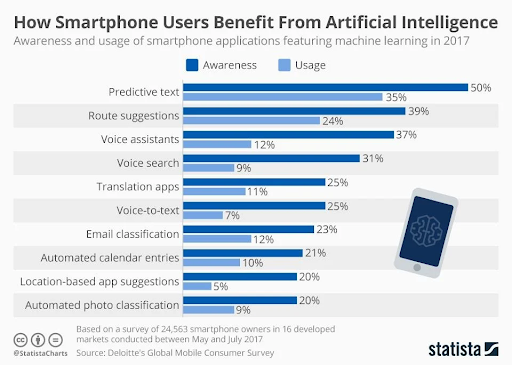In today's digital age, mobile app development has become a crucial aspect of business success. With the rise of Artificial Intelligence (AI) and Machine Learning (ML), integrating these technologies into mobile apps has become increasingly popular. This blog post will explore the benefits, challenges, and best practices of integrating AI and ML into your mobile app development process.

Understanding AI and ML in Mobile App Development
Artificial Intelligence (AI) and Machine Learning (ML) stand at the forefront of technological innovation, offering a paradigm shift in how mobile apps are developed, deployed, and enhanced. At their core, these technologies allow machines to analyze large volumes of data, learn patterns, and make decisions with minimal human intervention. In the realm of mobile app development, the application of AI and ML transcends traditional boundaries, enabling apps to provide personalized experiences, adapt to user behaviors, and improve over time.
AI powers features like chatbots and virtual assistants, offering users instant, personalized responses. Meanwhile, ML algorithms analyze user interactions and feedback to continuously refine app performance and user engagement strategies. This dynamic duo can significantly elevate the functionality of mobile apps, making them more intuitive and responsive to individual user needs.
Moreover, AI and ML integration into mobile apps opens the door to advanced capabilities such as predictive analytics, which forecasts future user behaviors based on past interactions. This insight is invaluable for businesses looking to anticipate customer needs and tailor their offerings accordingly. Image recognition and natural language processing are other prime examples of how AI can enhance the user experience, enabling more natural, human-like interactions with the app.
The integration of AI and ML into mobile app development requires a nuanced understanding of both the technologies and the specific objectives of the app. Developers must consider which aspects of AI and ML can best serve the app’s goals, from improving user engagement to automating operations and beyond. As these technologies continue to evolve, their potential to revolutionize mobile app development grows, promising more personalized, efficient, and intelligent apps that adapt to and predict user needs with unprecedented accuracy.
The Business Benefits of AI and ML Integration
Integrating AI and ML into mobile app development holds transformative potential for businesses across various sectors. These technologies not only enhance the functionality and user experience of mobile apps but also bring about substantial benefits that can significantly impact a business's bottom line.
- Personalization, which stands as a cornerstone of modern digital strategy, is greatly enriched through AI and ML, enabling apps to offer tailored content, recommendations, and interactions to each user. This level of personalization not only improves user satisfaction and engagement but also increases conversion rates and customer loyalty.
- Moreover, the automation of routine tasks is another critical advantage. By handling repetitive operations swiftly and efficiently, AI and ML free up human resources, allowing teams to focus on more strategic activities that require human insight. This shift not only optimizes operational efficiency but also reduces costs associated with labor and time-intensive processes.
- From a data analytics perspective, the integration of AI and ML into mobile apps provides businesses with deeper insights into user behavior and preferences. These insights are crucial for informed decision-making, enabling companies to refine their products, services, and marketing strategies in alignment with actual user needs and trends. Consequently, businesses can achieve a more precise market fit and competitive edge.
- Furthermore, AI and ML can significantly enhance the security of mobile apps. By analyzing patterns and detecting anomalies, these technologies can identify potential threats and vulnerabilities in real-time, safeguarding user data and business assets from cyber-attacks.
Identifying Your App's Needs for AI and ML
Before diving into the integration of AI and ML into your mobile app, it’s imperative to conduct a thorough analysis of your app’s unique requirements and the objectives you aim to achieve through these technologies.
- Begin by pinpointing the problems or inefficiencies your app aims to solve for its users. Is your goal to streamline customer service with an intelligent chatbot, or are you looking to offer a highly personalized user experience through machine learning-driven recommendations? Each goal will necessitate a different approach and set of AI or ML capabilities.
- Next, evaluate the nature of the data at your disposal. AI and ML technologies thrive on data; the quality, quantity, and type of data you can collect and process will significantly influence the effectiveness of AI and ML features within your app. Understanding the data you have access to will also help in identifying the most feasible and impactful AI and ML applications specific to your app’s context.
- Additionally, consider the technical infrastructure and expertise required to implement and support AI and ML functionalities. Assess whether your current team has the necessary skills or if you need to seek external partners for development and integration. This stage is crucial for setting realistic expectations and timelines for the integration process.
- Lastly, align your AI and ML integration goals with your overall business objectives. How do these technologies contribute to enhancing user satisfaction, driving engagement, or increasing revenue? By closely aligning your app's needs with your business goals, you can ensure that the integration of AI and ML technologies adds tangible value to your app and your business as a whole. This strategic alignment will guide your decisions throughout the integration process and ensure that the incorporation of AI and ML into your mobile app is both purposeful and impactful.
Finding the Right Development Partner
Selecting the ideal development partner to integrate AI and ML into your mobile app is a critical step that can significantly influence the outcome of your project. To ensure success, prioritize partnering with a company that not only has a strong portfolio demonstrating their expertise in AI and ML technologies but also understands the unique challenges and requirements of mobile app development. A partner with a robust track record in both areas is more likely to navigate the complexities of AI and ML integration effectively.
Experience in your industry can also be a deciding factor. Companies that have worked with businesses similar to yours will likely have a deeper understanding of your target audience, market dynamics, and regulatory environment. This knowledge can be invaluable in tailoring AI and ML features to meet your specific business objectives and user needs.
Communication and collaboration are other key considerations. The right partner should be willing to work closely with your team, keeping you informed and involved throughout the development process. They should be transparent about the challenges that might arise and proactive in suggesting solutions.
Lastly, assess the scalability and security measures the company implements in its projects. Given the evolving nature of AI and ML technologies, along with growing data privacy concerns, your development partner should demonstrate a forward-thinking approach to both scalability and cybersecurity. This ensures your app remains relevant, secure, and competitive in the long run.
Identifying a development partner that meets these criteria can empower your business to leverage AI and ML technologies effectively, enhancing your mobile app’s value and your company’s competitive edge in the digital marketplace.
Essential AI and ML Features for Mobile Apps
When embarking on the journey of enhancing your mobile app with AI and ML, prioritizing which features to integrate can set the foundation for a truly intelligent application. Predictive analytics stands out as a powerful tool, utilizing historical data to forecast future user behaviors, preferences, and potential issues, thereby enabling businesses to proactively adjust their strategies. Natural language processing (NLP) is another transformative feature, allowing apps to understand and interpret human language, making user interactions more intuitive and efficient, such as through advanced chatbots that handle customer service inquiries with unprecedented accuracy.
Image recognition technology opens up a plethora of possibilities, from simplifying search functionalities within the app by allowing users to upload images as queries, to enhancing security measures through biometric verification methods like facial recognition. Moreover, recommendation engines, powered by machine learning algorithms, can analyze user data to deliver personalized content, product recommendations, or services, significantly boosting user engagement and satisfaction.
Incorporating these AI and ML features requires careful consideration of the app’s objectives, the specific needs of the target audience, and the data available for analysis. Each feature, whether it's predictive analytics for anticipating user needs, NLP for smoother interactions, image recognition for a more interactive experience, or recommendation engines for personalized suggestions, can significantly contribute to creating a more engaging, efficient, and user-friendly app. The integration of these features, tailored to the app’s unique context and goals, can transform a conventional app into a dynamic, intelligent platform that stands out in the competitive digital marketplace.
Designing for Scalability and Security
In the intricate landscape of mobile app development, prioritizing scalability and security from the outset is paramount, especially when integrating AI and ML technologies. A scalable app is designed to accommodate an increase in users and data without compromising on performance or user experience. This entails architecting a flexible backend infrastructure that can dynamically adjust resources based on real-time demands, ensuring the app remains responsive and efficient regardless of user load.
Security, on the other hand, becomes increasingly complex with the integration of AI and ML. These technologies process vast amounts of data, some of which can be highly sensitive. Protecting this data against unauthorized access, breaches, and leaks is critical. Implementing robust encryption methods for data at rest and in transit, using secure APIs, and adhering to privacy regulations such as GDPR and CCPA are essential steps in safeguarding user information. Moreover, AI and ML models themselves can be targets for attacks, where malicious inputs are designed to trick the system into making incorrect decisions. Hence, incorporating mechanisms to detect and mitigate such adversarial attacks is crucial.
Designing with scalability and security in mind involves adopting best practices such as using cloud services that offer automatic scaling and security features, employing containers for easier deployment and isolation, and integrating security tools and services early in the development process. Regular security audits, penetration testing, and staying abreast of the latest in cybersecurity trends and threats also play a vital role in maintaining the integrity of the app.
Ultimately, a successful integration of AI and ML into mobile apps requires a deliberate approach that considers not just the immediate functionality but also the long-term viability and trustworthiness of the application.
Budgeting for AI and ML Integration
Navigating the financial landscape of integrating AI and ML into your mobile app involves careful planning and foresight. The investment in these technologies is not just a one-time cost but spans the entire lifecycle of the app, from initial development to ongoing maintenance and updates. It's essential to evaluate the scope of AI and ML features you plan to implement and consider the resources required for their development, including the expertise of your development team or partner.
Start by identifying the specific AI and ML functionalities that align with your app’s goals and user needs. Each feature, from chatbots and recommendation engines to predictive analytics, comes with its own set of development challenges and costs. The complexity of the algorithms, the volume and type of data needed to train the models, and the processing power required all influence the overall budget.
Additionally, factor in the costs associated with data collection and processing, including data storage and management infrastructure. Secure, scalable cloud services can offer cost-effective solutions but require careful selection and management.
Ongoing expenses also play a critical role in your budgeting plan. AI and ML models need continuous tuning and updating to stay effective and adapt to new data or changing user behaviors. This includes the costs of retraining models with new data, refining algorithms to improve performance, and deploying updates to the app.
Collaboration with a development partner experienced in AI and ML can provide valuable insights into budgeting effectively for these technologies. They can offer guidance on prioritizing features, optimizing development processes, and leveraging cloud services to manage costs without compromising on the quality and security of your app.
The Development Process: Step by Step
The development process for integrating AI and ML technologies into your mobile app unfolds in several strategic phases, designed to ensure the seamless incorporation of these advanced capabilities. Initially, the journey begins with a comprehensive data collection stage, where relevant data that will feed into the AI and ML models is gathered. This could involve user behavior data, interaction logs, or any other data pertinent to the app’s objectives.
Following data collection, the next step involves model training. Here, AI and ML algorithms are taught to recognize patterns, make predictions, or understand natural language based on the collected data. This phase is crucial, as the accuracy and efficiency of the models depend heavily on the quality and volume of the training data.
After the models have been trained, rigorous testing is conducted. This phase is designed to identify and rectify any inaccuracies or inefficiencies within the models. Testing ensures that the AI and ML integrations perform as expected, providing the desired enhancements to the app without compromising user experience or functionality.
Once testing is satisfactorily completed, the deployment phase follows. During this stage, the AI and ML functionalities are integrated into the app’s existing ecosystem, making them available to end-users. Careful monitoring accompanies this phase to observe how well the models adapt to real-world data and usage patterns, allowing for immediate adjustments if necessary.
Throughout these stages, collaboration with your development partner remains a cornerstone of success, ensuring that each step of the process aligns with the app’s goals and user needs. This structured approach to development ensures the effective integration of AI and ML, setting a strong foundation for creating an app that is not only intelligent but also user-centric and responsive to evolving demands.
Facing challenges with AI and ML integration in your mobile app? Trust Hidden Brains for the top mobile app development services in India to solve them efficiently!
Overcoming Challenges in AI and ML Integration
Integrating AI and ML into mobile apps can pose several hurdles, including the complexity of technology, ensuring data privacy, and seamless integration with existing systems. To navigate these challenges, a comprehensive approach is essential.
- First, the complexity of AI and ML demands specialized knowledge and skills. Building or expanding your team to include AI experts or partnering with experienced development firms can mitigate this. These professionals can streamline the integration process, translating complex AI concepts into practical applications within your app.
- Addressing data privacy concerns is another critical aspect. With AI and ML relying heavily on user data, adhering to data protection regulations and implementing robust security measures is paramount. Encrypting data, both in transit and at rest, alongside deploying secure authentication mechanisms, can safeguard user information against breaches and unauthorized access.
- Seamless integration with existing systems requires a well-architected framework that accommodates the new AI and ML functionalities without disrupting the app’s core operations. This involves rigorous testing and quality assurance processes to ensure compatibility and performance are maintained at every stage of the integration. Additionally, adopting agile development practices allows for continuous evaluation and adaptation, facilitating smoother integration of AI and ML technologies.
- Lastly, preparing for the continuous evolution of AI and ML technologies is vital. Keeping abreast of technological advancements ensures your app remains relevant and competitive. Regular updates and model retraining can help your app adapt to changing user behaviors and preferences, ensuring the long-term success of your AI and ML integration efforts.
Future Trends in AI and ML for Mobile Apps
As we look towards the horizon, the integration of AI and ML within mobile apps is set to push the boundaries of innovation even further. One of the most anticipated trends is the advancement of conversational AI, which is expected to evolve beyond simple chatbots to more sophisticated virtual assistants capable of understanding and performing complex tasks, offering a seamless interaction experience for users. Additionally, the expansion of edge AI is on the rise, enabling faster and more efficient processing directly on mobile devices without the need for constant cloud connectivity. This shift not only enhances app performance but also addresses privacy concerns by keeping sensitive data on the device.
Another significant trend is the incorporation of AI-powered predictive and prescriptive analytics in mobile apps. These capabilities will allow businesses to anticipate user needs and behaviors, offering personalized experiences and recommendations with uncanny accuracy. Moreover, the integration of augmented reality (AR) with AI is set to create more immersive and interactive app experiences, especially in sectors like retail, education, and entertainment.
The advancements in federated learning, a method of training ML models across multiple decentralized devices while keeping data localized, promise to revolutionize the way mobile apps learn from user interactions, all while safeguarding user privacy. As these technologies continue to mature, we can expect mobile apps to become more intuitive, personalized, and engaging, redefining the way we interact with our digital world.
Wrapping up
As we conclude our exploration into the integration of AI and ML within mobile app development, it's clear that these technologies hold the key to unlocking unprecedented levels of personalization, efficiency, and innovation. From enhancing user engagement through predictive analytics to bolstering app security with advanced threat detection algorithms, the potential benefits are immense. However, successfully harnessing these benefits demands a thoughtful approach to integration, mindful of both the technological complexities and the ever-present need for data privacy and security.
It also requires selecting the right development partner who can navigate these challenges and help bring your vision to life. Looking ahead, the landscape of mobile app development is set to evolve rapidly, driven by advances in AI and ML. By staying informed and adaptable, businesses can leverage these technologies to create truly dynamic and valuable mobile apps that stand out in a competitive digital marketplace. In embracing AI and ML, we're not just developing apps; we're shaping the future of how businesses interact with technology and, ultimately, with their users.







